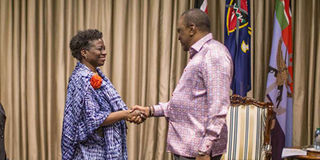Gender Bill is good for everyone, don’t blame women MPs if it fails

President Uhuru Kenyatta welcomes United Nations Population Fund Executive Director Natalia Kanem to State House, Nairobi, on March 7, 2019. She urged leaders to endorse gender equality. PHOTO | SAMWEL MIRING'U | PSCU
What you need to know:
- Although utterly illogical, our society continues to make leadership decisions based more on personal abilities rather gender.
- The need to level the field for election of more women to Parliament, county assemblies and other decision-making bodies cannot be gainsaid.
Last week, United Nations Under-Secretary-General and Executive Director of the United Nations Population Fund (UNFPA) Natalia Kanem was in Kenya.
But what stood out was that she chose to celebrate the International Women’s Day in the country.
In her various presentations, Dr Kanem, one of the highest-ranking women in the topmost global body, made it clear that, indeed, the world respects and trusts Kenya to lead in gender equality and women empowerment.
These, she noted, are critical not only for the realisation of the Sustainable Development Goals but also the 1994 International Conference on Population and Development’s (ICPD) vision.
Kenya will host the next summit in November this year. The objective of the summit is to renew undertakings to attain ICPD’s goal of sexual and reproductive health for women, 25 years later.
BILL FLOPS
In a one-on-one chat with Dr Kanem, I began reflecting on the attitude of the Kenyan Parliament, and public, towards the very serious matter of the Constitution of Kenya (Amendment) Bill 2018: The ‘Gender bill’.
The latest attempt at passing the bill — which seeks to legislate on the constitutional requirement that neither gender should have more than two-thirds in elective positions — failed, for the fourth time.
Only 174 of the 349 MPs were in the House on this last Wednesday of February; 175 public employees chose to miss work when most needed.
That was sad. But it got sadder when some began advancing cock-and-bull stories to justify the flopping of the bill.
One was that women MPs failed to lobby their male colleagues to support the bill, with the blame being heaped on the Kenya Women Parliamentary Association (Kewopa).
MERIT
But this is wrong buck passing. First, the Gender Bill is not just about women but all Kenyans. Secondly, an MP should not miss debate or fail to vote on a matter just because they have not been lobbied.
It is their duty. Who lobbies teachers or doctors to do their work? Thirdly, the bill is not a Kewopa or women’s thing; it is a government-sponsored motion whose mover is the Leader of Majority in the House — a man.
Closely related to this is the narrative that ‘women are their own worst enemies’ and, hence, won’t support their fellow women for a cause or leadership position. Sadly, this comes up when the bill is up for debate.
Our society continues to make leadership decisions based more on personal abilities rather gender.
Women and men are elected not because of their anatomy; they convince the voters they are equal to the task.
PROGRESS
But the need to level the field for election of more women to Parliament, county assemblies and other decision-making bodies cannot be gainsaid.
To prove the progressive nature of the Kenyan voter, though it grinds slowly, three women were elected as governors and three others to the Senate in the 2017 General Election from none in 2013.
And we now have 23 elected women MPs in the National Assembly, up from 16 in 2013. The hitherto conservative communities have also elected women to high office.
Sophia Abdi is the MP for Ijara Constituency, in North Eastern Kenya, while Fatuma Dullo is the Isiolo County senator.
On her fourth term, Dr Naomi Shaban, of Taita-Taveta, is the second longest-serving MP. The Parliamentary Service Commission (PSC) vice chairperson is the longest-serving elected woman MP.
RESPONSIBILITY
Charity Ngilu (Kitui), Dr Joyce Laboso (Bomet) and Anne Waiguru (Kirinyaga) were elected governors on merit.
To attempt to justify the rejection of the Gender Bill on women’s electoral choices is to miss the point. They have a right to vote for a candidate of their choice and nobody should make them feel guilty for that.
When they fail to rise to the occasion, the MPs should not try to rationalise their ineptitude but be ‘man enough’ and own up to their failure.
Parliament has another chance, in six months, to pass the bill. If not, it will have itself to blame.
Ms Rugene is a consulting editor. [email protected], @nrugene





